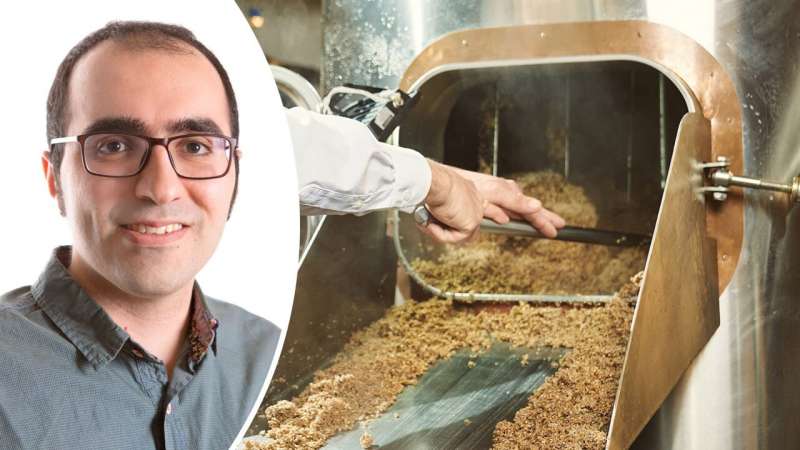
Beer is the most consumed beverage in the world after water and tea, and beer brewing generates large amounts of grain waste, which today has a low value. But now a research project at the University of Borås, Sweden, shows how it is possible to increase the value of this by the production of food, biofuel and valuable chemicals.
Mohsen Parchami, newly awarded doctorate in Resource Recovery, has in his doctoral project investigated how to change the attitude from grain remains being regarded as waste to instead being seen as raw material for new products. Of particular interest is that it is possible to grow protein-rich, edible, filamentous fungi on the remains of the brewery waste.
“One goal of my project was to return something that comes from food production back into the same cycle. By producing this protein-rich food, one can contribute to higher safety in food production and reduce the pressure on agriculture and animal husbandry,” explained Mohsen Parchami.
The fungi that were grown on the grain waste have been used as an ingredient in a recently developed food product, among other things. The project also developed a new method for pre-treating the waste to be able to separate its various constituents into, among other things, starch, protein and cellulose. All these constituents are a source of new potential uses.
Various possibilities were then investigated to produce a range of new products such as biofuel, bioplastics and ingredients for food production. The project also considered the possibilities for production of other valuable products such as biogas, biohydrogen and volatile fatty acids.
Benefits for the brewing industry
“If the breweries knew what opportunities there are in converting grain waste into all these products, it could benefit them, both from an economic and environmental point of view,” said Mohsen Parchami.
The project also developed a new fractionation process and a concept for a biorefinery to be able to extract valuable substances such as proteins, fibers and antioxidants.
“The project is of great importance in that it gives a solution to many current problems of our time, by showing how it is possible to reduce the amount of waste and the impact on the environment while at the same time opening for new opportunities for the brewing industry,” said Mohsen Parchami.
The project responds to several of the UN’s global goals, including the goals No hunger, Health and well-being, Clean water and sanitation for all, Sustainable energy, Sustainable industry and innovation, Sustainable consumption and production, and more.
More information:
Unlocking the Potential of Brewer’s Spent Grain: Sustainable Biorefinery Approach and Value-Added Product Generation, urn.kb.se/resolve?urn=urn:nbn:se:hb:diva-29573
Provided by
University of Borås
Citation:
Unlocking the potential of brewer’s spent grain: Sustainable biorefinery approach and value-added product generation (2023, June 26)
retrieved 26 June 2023
from https://phys.org/news/2023-06-potential-brewer-spent-grain-sustainable.html
This document is subject to copyright. Apart from any fair dealing for the purpose of private study or research, no
part may be reproduced without the written permission. The content is provided for information purposes only.










